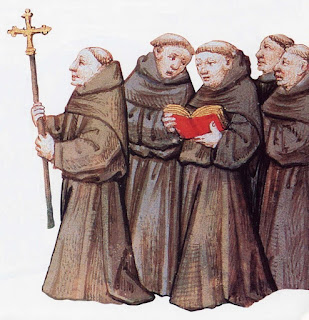Names that seem historically accurate are a difficult thing to find, so I made this list of "campaign appropriate" names for my NPCs, and decided to share it with my players too.
Frankish Names -
Frankish (Germanic Frankish)
Male Names -
Abrahil, Abram, Adalbald, Adalbert,
Adalgari, Adalgrim, Aegidius, Ageric, Agilbert, Agiulf, Ailbert,
Albric, Aldedramn, Andica, Ansovald, Arcambald, Aregisel, Arnegisel,
Arnulf, Ascaric, Audovald, Austregisel, Autbert, Autgari, Autgeri,
Avremar Badegisel, Balduin, Barnard, Berald, Bernard, Berneri, Bero,
Berold, Berthefried, Bertlin, Bertram, Bertrand, Burchard, Karloman,
Ceslin, Chararic, Charibert, Childebert, Childeric, Chilperic,
Chlodomer, Chlothar, Chramnesind, Clodio, Clodion, Clovis, Creat,
Dagaric, Dagobert, Drogo, Eberulf, Ebregisel, Engilbert, Euric,
Everard, Faroard, Faroin, Feremund, Feroard, Foroen, Frobert,
Frotari, Frothard, Frothari, Frotlaic, Fulcari, Fulcrad, Galteri,
Gararic, Garivald, Gaucelm, Gaudulf, Gaujoin, Gausbert, Gausbold,
Gautmar, Gauzbert, Gedalbert, Gedalca, Genobaud, Gerbert, Gerhard,
Gerold, Gislari, Gislevert, Gocelm, Godalbert, Godomar, Gozhelm,
Grimald, Guadulf, Gualtari, Gualter, Guillabert, Guitard, Gundobad,
Gunthar, Guntram, Haldemar, Hartmut, Hildebald, Hildebold, Hildegaud,
Hildevold, Hildoin, Hucbert, Hugbert, Imnachar, Ingalbert, Ingomer,
Karl, Lambert, Lantbert, Leudast, Lothar, Magnachar, Magneric,
Mainard, Mallobaudes, Marachar, Marcomer, Marell, Martin, Maurifi,
Meginhard, Merogais, Merovech, Munderic, Niebelung, Odelric, Odolric,
Otbert, Otgeri, Otker, Pepin, Pharamond, Pippin, Radulf, Ragambald,
Ragena, Ragenard, Raginari, Ragnachar, Ragnald, Ragno, Raimbold,
Rainald, Ramnulf, Rathar, Raynold, Reginari, Ricchar, Rignomer,
Roland, Robert, Rotbert, Segoin, Seguin, Sicbald, Sichar, Sicland,
Sicleard, Siclevold, Sigebald, Sigebert, Sigeric, Sigismund,
Sigobert, Sinop, Sunnegisil, Sunno, Tancrad, Tancred, Tassilo,
Teotbert, Tetbert, Teutbald, Teutbert, Theoderic, Theoric,
Theudebald, Theudemeres, Theuderic, Theudoald, Theutbald, Trutgaud,
Vuitard, Vulfari, Vulframn, Vulvari, Waltgaud, Werinbert, Wilbert,
Willichar, Wolfari
Female Names -
Adalgardis, Adallinda, Adaltrude,
Adeltrudis, Adaluildis, Adelaidis, Airsenda, Albofleda, Albrada,
Alda, Aldegonde, Aliberta, Alitrudis, Ansegudis, Ansegundis,
Anstrude, Arsindis, Audofleda, Audovera, Austreberta, Austrechild,
Balthild, Begga, Beretrude, Bernegildis, Bertenildis, Berthefled,
Berthefried, Berthegund, Berthildis, Bertilla, Bertrada, Bladovildis,
Brunhild, Burgundofara, Celsa, Celsovildis, Cesaria, Chlodosind,
Chlothsinda, Clotild, Creada, Dagena, Eldesendis, Ermengardis,
Ermengildis, Ermensindis, Eustadiola, Faileuba, Faregildis, Fastrada,
Framberta, Fredegunde, Frolaica, Frotberga, Frotlildis, Frotlina,
Galswinth, Gaudildis, Gautlindis, Genovefa, Gersvinda, Gertrude,
Gisela, Glodesind, Goiswinth, Gotberga, Gundrada, Halderudis,
Harildis, Hildegarde, Hildegardis, Hildesendis, Hiltrude,
Illegardis, Ingitrude, Ingohildis, Ingunde, Itta, Landina,
Lanthechilde, Lantsida, Leubast, Leubovera, Leutberga, Leutgardis,
Liutgarde, Madelgarde, Magnatrude, Marcatrude, Marcovefa, Martinga,
Monegund, Morberga, Radegund, Rictrude, Rigunth, Rosamund, Rothaide,
Rotrude, Ruothilde, Rusticula, Sadalberga, Siclehildis, Sigalsis,
Theodelinda, Theoderada, Ultrogotha, Vuldretrada, Waltrude
Latin Frankish (Old French)
Male Names -
Édouard, Érrard, Étienne, Adalbert,
Adémar, Adrien, Aimery, Alain, Aldebert, Aldéric, Alphonse,
Amaury, Amédée, Ancel, André, Angelbert, Antoine, Archambaud,
Arnaud, Arnault, Arnoul, Aubry, Aymar, Barthélémi, Baudouin,
Benoît, Bérenger, Bernard, Bertrand, Bohemond, Boson, Bouchard,
Centule, Charles, Clotaire, Ebbon, Enguerrand, Eudes, Eustache,
Evrard, Foulques, François, Frédéric, Géraud, Gargamel,
Gaucher, Gaucelin, Gauthier, Geoffroy, Géraud, Gelduin, Gilbert,
Gilles, Godefroy, Guichard, Guiges, Guilhem, Guillaume, Guy, Hélie,
Hamelin, Henri, Herbert, Hildebert, Hugues, Humbert, Jacques, Jaufré,
Jaspert, Jean, Josselin, Jourdain, Julien, Léon, Léonard, Lothaire,
Louis, Loup, Manassès, Mathieu, Maurice, Nicolas, Ogier, Onfroy,
Orson, Othon, Payen, Philippe, Pierre, Raimbaut, Raoul, Raymond,
Raynaud, Renaud, Richard, Robert, Robin, Roger, Rorgon, Rorgues,
Roubaud, Savary, Sigismond, Simon, Thibault, Thiébaut, Thierry,
Thomas, Valeran, Yves
Female Names -
Éléonore, Élodie, Étiennette,
Adèle, Adalmode, Adelaide, Adelinde, Agathe, Agnès, Aléarde,
Alice, Aliénor, Alix, Almodis, Amelie, Anne, Antoinette, Arsinde,
Aude, Aurengarde, Béatrice, Béatrix, Belleassez, Benoîte,
Bérengère, Berthe, Blanche, Bonne, Bourgogne, Bourguigne, Cécile,
Cathèrine, Charlotte, Constance, Denise, Douce, Echive, Eglantine,
Elisabeth, Emma, Ermengarde, Ermessinde, Esclarmonde, Euphrosine,
Eustachie, Eve, Gerberge, Gisèle, Guillaumette, Héloise, Helvis,
Hodierne, Ide, Ida, Ildégarde, Isabeau, Isabelle, Jeanne, Judith,
Julienne, Mafalda, Mahaut, Margot, Marguerite, Marie, Marthe,
Mascarose, Mathilde, Mélisande, Mélisende, Mélusine, Péronelle,
Pernelle, Perinne, Pernette, Plaisance, Raymonde, Sarrazine, Solène,
Sophie, Stéphanie, Sybille, Tiburge, Valence, Yolande
Wendish Names -
Male Names -
Aleksander, Andrzej, Antoni, Aron,
Barnim, Bartosz, Bedrich, Bezprzym Blazej, Bogislaw, Bohdan,
Bohumir, Boleslaw, Boriwoj, Bozydar, Branimir, Branislav, Bretislav,
Casimir, Ctibor, Dobieslaw, Dobromil, Drosuk, Dytryk, Frantisek,
Gawel, Grzegorz, Havel, Jacenty, Jakub, Jakusz, Janusz, Jaromar,
Jaromil, Jaromir, Jaroslav, Jedrzej, Jindrich, Jirí, Jozef, Juliusz,
Kajetan Kamil, Karel, Kasper, Kazimierz, Kliment, Kolman, Kornel,
Kresimir Krzeslaw, Krzysztof, Lech, Leszek, Lubomir, Lucjan, Ludvik,
Marek, Marian, Martin, Mateusz, Mieszko, Mikolás, Miloslaw, Milosz,
Miroslaw, Mscislaw, Msciwoj, Oldrich, Ondrej, Otokar, Patryk, Pawel,
Piotr, Prendota, Przemysl, Przybyslaw, Radomil, Radomir, Radoslav,
Rostislav, Ryszard, Sambor, Sobieslav, Stanislaw, Strasz, Swietopelk,
Swietoslaw, Szczepan, Szczesny, Szymon, Tadeusz, Tomasz, Udalrich,
Urjasz, Vojtech, Waclaw, Walenty, Wratislaw, Wawrzyniec, Wenceslaw,
Wincenty, Wizlaw, Wladyslaw, Wlodek, Wlodzimierz, Wlodzislaw,
Wratislaw, Zbigniew, Zdenek, Zdislav, Zygmunt
Female Names -
Agnieszka, Alzbeta, Andela, Anna,
Berta, Bohuslava, Bozena, Branislava, Dagmar, Danuta, Dobravy,
Dobroniega, Dorota, Dragomira, Edyta, Ewa, Geira, Gertruda, Gracja,
Grazyna, Halina, Hanna, Irena, Izabela, Jadwiga, Jarka, Jarmila,
Jolanta, Judyta, Kamila, Katarina, Kenna, Kornelia, Krystyna, Ksenia,
Lidia, Ludmila, Magda, Magdalena, Malgorzata, Marcelina, Maria,
Markéta, Martyna, Mateja, Matylda, Milena, Miroslava, Pechna, Róza,
Radomila, Radomira, Radoslava, Raina, Regelinda, Rycheza, Salomea,
Smiechna, Stanislava, Stefana, Svetlana, Urszula, Václava,
Vladislava, Wera, Wojslawa, Zdenka, Zofia, Zwinislawa






